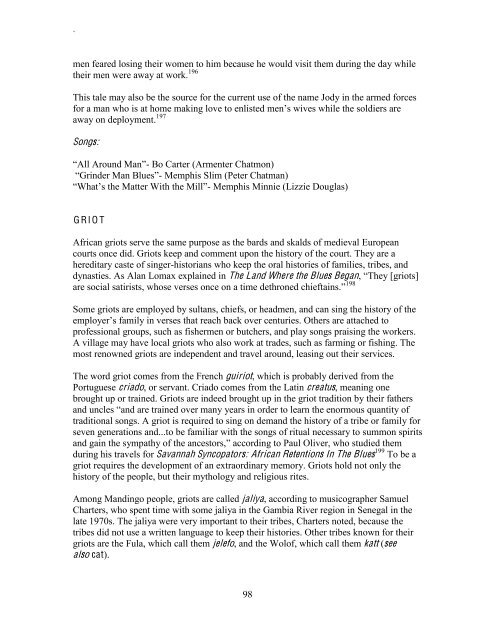Language of the Blues - Edmonton Blues Society
Language of the Blues - Edmonton Blues Society
Language of the Blues - Edmonton Blues Society
Create successful ePaper yourself
Turn your PDF publications into a flip-book with our unique Google optimized e-Paper software.
`<br />
men feared losing <strong>the</strong>ir women to him because he would visit <strong>the</strong>m during <strong>the</strong> day while<br />
<strong>the</strong>ir men were away at work. 196<br />
This tale may also be <strong>the</strong> source for <strong>the</strong> current use <strong>of</strong> <strong>the</strong> name Jody in <strong>the</strong> armed forces<br />
<br />
away on deployment. 197<br />
Songs:<br />
- Bo Carter (Armenter Chatmon)<br />
- Memphis Slim (Peter Chatman)<br />
- Memphis Minnie (Lizzie Douglas)<br />
G RI O T<br />
African griots serve <strong>the</strong> same purpose as <strong>the</strong> bards and skalds <strong>of</strong> medieval European<br />
courts once did. Griots keep and comment upon <strong>the</strong> history <strong>of</strong> <strong>the</strong> court. They are a<br />
hereditary caste <strong>of</strong> singer-historians who keep <strong>the</strong> oral histories <strong>of</strong> families, tribes, and<br />
dynasties. As Alan Lomax explained in The Land Where <strong>the</strong> <strong>Blues</strong> Began<br />
198<br />
are social satirists, whose ve<br />
Some griots are employed by sultans, chiefs, or headmen, and can sing <strong>the</strong> history <strong>of</strong> <strong>the</strong><br />
<br />
pr<strong>of</strong>essional groups, such as fishermen or butchers, and play songs praising <strong>the</strong> workers.<br />
A village may have local griots who also work at trades, such as farming or fishing. The<br />
most renowned griots are independent and travel around, leasing out <strong>the</strong>ir services.<br />
The word griot comes from <strong>the</strong> French guiriot, which is probably derived from <strong>the</strong><br />
Portuguese criado, or servant. Criado comes from <strong>the</strong> Latin creatus, meaning one<br />
brought up or trained. Griots are indeed brought up in <strong>the</strong> griot tradition by <strong>the</strong>ir fa<strong>the</strong>rs<br />
and <br />
traditional songs. A griot is required to sing on demand <strong>the</strong> history <strong>of</strong> a tribe or family for<br />
seven generations and...to be familiar with <strong>the</strong> songs <strong>of</strong> ritual necessary to summon spirits<br />
<br />
during his travels for Savannah Syncopators: African Retentions In The <strong>Blues</strong> 199 To be a<br />
griot requires <strong>the</strong> development <strong>of</strong> an extraordinary memory. Griots hold not only <strong>the</strong><br />
history <strong>of</strong> <strong>the</strong> people, but <strong>the</strong>ir mythology and religious rites.<br />
Among Mandingo people, griots are called jaliya, according to musicographer Samuel<br />
Charters, who spent time with some jaliya in <strong>the</strong> Gambia River region in Senegal in <strong>the</strong><br />
late 1970s. The jaliya were very important to <strong>the</strong>ir tribes, Charters noted, because <strong>the</strong><br />
tribes did not use a written language to keep <strong>the</strong>ir histories. O<strong>the</strong>r tribes known for <strong>the</strong>ir<br />
griots are <strong>the</strong> Fula, which call <strong>the</strong>m jelefo, and <strong>the</strong> Wol<strong>of</strong>, which call <strong>the</strong>m katt (see<br />
also cat).<br />
98


